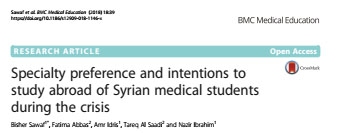
Authors
Bisher Sawaf, Fatima Abbas, Amr Idris, Tareq Al Saadi and Nazir Ibrahim
Published in
BMC Medical Education (2018) 18:39
Abstract
Background
Little research addresses how medical students develop their choice of specialty training in crises and resource-poor settings. The newly graduated medical students determine the future of the healthcare system. This study aims to elucidate the factors influencing Syrian medical students’ specialty selection and students intention to study abroad.
Methods: A cross-sectional study carried out at the universities of Damascus, Al-Kalamoon and the Syrian Private University in Syria using self-administered questionnaire to investigate medical students’ specialty preferences and plans for career future. The questionnaire included questions about students’ demographic and characteristics, intention to train abroad, the chosen country for training.
Results: Randomly selected 450 students completed the questionnaire. The two most common specialties selected were general surgery (27.6%) and internal medicine (23.5%). The most influencing factors on their decision were flexibility of specialty’ (74.8%) and ‘Better work opportunities after specializing’ (69.1%). Most partipants stated that they are interested in specializing abroad outside Syria (78.7%). The two most common countries Germany (35.5%) and the United States of America (24.6%). Acquiring a visa to the foreign countries of choice was the most common obstacle of specializing abroad (n = 186, 53.6%). Male gender, having a previous clinical abroad m and having friends or relatives living abroad were significant factors in predicting students’ interest in specializing abroad.
Conclusion: Internal medicine and surgery are the most reported specialties of choice in this study and the participants reported intentions to study abroad. Their specialty preferences are influenced by both familiar epidemiological and war-driven factors. These data can be useful to design further cohort study to understand war-related affecting factors on students’ plans for their career in the effort of improving the balance of healthcare system in Syria.
Keywords
Undergraduate medical education, Postgraduate training, Specialty preferences, Syria, War, Crisis
Links
bmcmededuc.biomedcentral.com/articles/10.1186/s12909-018-1146-x
Syrian Private University - Scentafic Research @ 2024 by Syrian Monster - Web Service Provider | All Rights Reserved